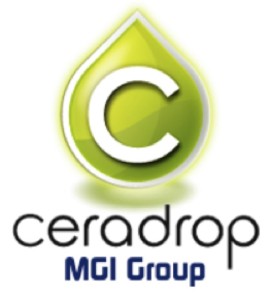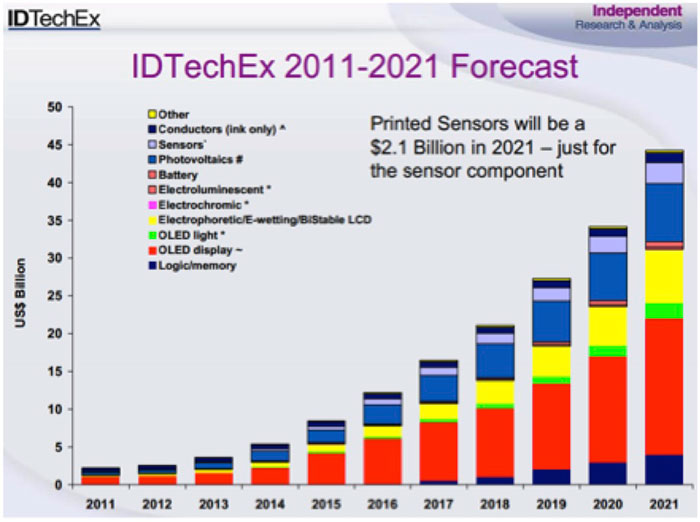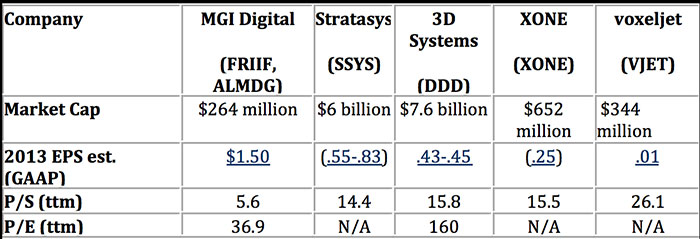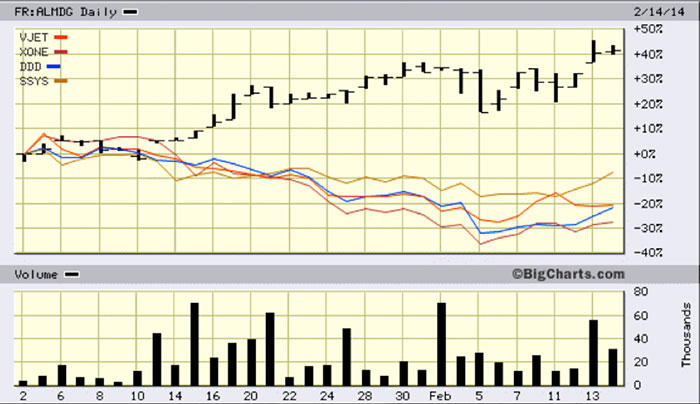Investors in 3D printing stocks looking for a 3D printer manufacturer with high growth, cutting-edge patented technology and strong fundamentals may want to consider adding MGI Digital Graphic Technology to their portfolio.
MGI trades with ticker (ALMDG) on the NYSE Euronext, and began trading on the U.S. OTC with ticker (FRIIF) today.
MGI Digital recently acquired 100% of an electronics 3D printer manufacturer and intends to become a global power in 3D printing of electronic components. Moreover, the company has a trailing PE of 40… a metric unheard of in 3D printer OEMs.
Company Overview
Founded in 1982 and headquartered outside Paris, France, MGI Digital Graphic Technology is an established leader in the design, manufacture, marketing, and distribution of digital printers and related products. The company has a global presence with MGI France serving the European, Middle Eastern, and African markets, MGI USA (in Florida) serving North and South America and the Caribbean markets, and MGI Asia Pacific (in Singapore) serving the Asia Pacific markets.
MGI has just 4.95 million shares outstanding, a market cap. of $264 million, and a history of strong revenue and EPS growth as the table below demonstrates. Important note: these figures are GAAP.
Source: Reuters Profile and NYSE Euronext Exchange. (Conversion rate of 1 EUR = 1.36 USD used)
Entering 3D Printing with Acquisition of Printer Manufacturer- Targeting 3D Printed Electronics Industry
Late last year MGI acquired 100% of privately held CERADROP, a manufacturer of high-end industrial 3D printers for the electronics industry.
Regarding the acquisition, Edmond Abergel, president of MGI Digital Graphic Technology, stated:

Ceradrop has developed advanced machines for printing 3D-ceramic and organic electronic components with high added-value, such as antennas, Organic Light Emitting Diode (OLED) display screens, electronic chip cards, solar cells, RFID tags, printed batteries and biomedical sensors. These components can be printed onto a wide variety of materials such as glass, metals, polymers plastics and paper.
Because the Ceradrop 3D printers are designed specifically for the electronics component market, they don’t resemble other commercial 3D printers. I asked leading 3D printing industry expert Todd Grimm if the Ceradrop printers are “true 3D printers”. Todd replied, “Yes. Ceradrop printers have all the qualifications of 3D printing/additive manufacturing.”
I also asked Christopher Barnatt, author of 3D Printing: The Next Industrial Revolution if he would explain a bit about the technology Ceradrop printers use. Chris wrote back: “In the Ceradrop printing process, material is laid down, cured by light, more material is laid down, etc., while using multiple print heads. So in ASTM terms the process here is material jetting, the generic term that includes 3DP technologies like the Polyjet process used in the Objet Connex printers from Stratasys.”
MGI Welcomes Ceradrop
I spoke with MGI’s V.P. of Sales and Marketing, Kevin Abergel, in Florida about the Ceradrop acquisition. Mr. Abergel explained that the plan by MGI is to leverage their existing channels “To take Ceradrop to the next level — a global power in 3D printing of electronics,” and to realize “R&D synergies” between Ceradrop and MGI. Ceradrop is also the exclusive licensee for WIPO patent WO2005023523, “Method and device for the production of a three-dimensional multi-material component by means of ink-jet-type printing.”
MGI has an extensive customer base for Ceradrop to tap into…a distribution network in over 70 countries globally according to Mr. Abergel.
I believe access to these sales channels combined with Ceradrop’s patented technology and early mover advantage in the 3D printed electronics industry can facilitate and accelerate sales going forward. Moreover, like other 3D printer manufacturers, Ceradrop realizes recurring revenue streams from both services and the consumable materials used by the printers.
More Sales than Voxeljet and Price Range $300,000-$500,000
I also called Tim Luong, Ceradrop’s National Sales Manager in Sacramento, CA to learn about the price range for their printers and 2013 sales. Prices for the X-Serie printers start in the $300,00-$500,000 range, not surprising given the high degree of precision and leading-edge technology required for printed electronics. What did surprise me is the number of printer sales Ceradrop had in 2013. While Mr. Luong couldn’t share all the details, he did say that in the last twelve months Ceradrop has X-Serie sales (or sales pending) in Canada, on the U.S. West Coast, the U.S. East Coast, and “multiple” countries in Europe.
One can infer from this information that Ceradrop had a minimum of 5 sales of their X-Serie printers during 2013. For the sake of comparison, this is at least 2 more than voxeljet AG (VJET) has reported for the last 12 months, and most of these sales would have been made prior to Ceradrop’s access to new sales channels in over 70 countries.
$35 Billion Market by 2020
Forbes predicts that electronics will be one of seven industries most disrupted by 3D printing.
Forbes: “Designing and 3D printing electronics with optimal shape and styling properties will be common. 3D printing is ideal for the complex geometric features needed in small, compact electronic circuit boards that use multiple materials ranging from low conductivity plastics to high conductivity metal materials.”
There are substantive advantages of 3D printed electronics vs. traditional manufacturing technology that will drive the market’s growth for Ceradrop printers. These include lower investments, the ability for mass customization, improved component performance, and the integration of components on substrates of any size and complexity. Due to these factors, IDTechEx Market Research estimates the market for printed electronics (which equalled under $5 billion in 2012) will grow rapidly to $35 billion in 2020 and an astounding $300 billion by 2030.
As this chart indicates, the lion’s share of growth in 3D printed electronics according to IDTechEx Market research will be in printing of OLED displays (in red). This is a huge segment that Ceradrop has early mover advantage in.
Ceradrop Printer Chosen for Research at Northwestern University
Tobin J. Marks, Ph.D. is one of the world’s leading experts on printed electronics and the co-founder of Polyera, a privately-held R&D company that also supplies semiconductors, dielectrics, and interfacial materials for the printed electronics industry. Dr. Marks and his team at Northwestern chose a Ceradrop X Serie printer for their research, commenting:
“We chose to work with Ceradrop because they were the unique equipment manufacturer able to provide us with the required support that will permit us to make the inkjet printing process easier for Printed Electronics.”
Konica Minolta Buying 10% Stake in MGI
On January 21, 2014 Konica Minolta announced they are investing in a 10% ownership stake in MGI as part of “a strategic alliance that leverages both co-development and the co-marketing of existing and future products” while MGI retains its independence. Konica Minolta’s press release also states that “This investment will be dedicated to drive future growth.”
This is more meaningful than a vote of confidence by an industry giant. This strategic alliance opens even more sales channels and growth opportunities for Ceradrop printers through Konica Minolta’s vast international network.
Value Price + Large-Scale Expansion of Sales Channels
MGI offers investors excellent value compared to the well-known 3D printer manufacturers as the chart below demonstrates. Looking forward, MGI’s Ceradrop 3D printer division now has access to sales channels in over 70 countries with likely future expansion through MGI’s new partnership with Konica Minolta. Because the Konica Minolta partnership was formed to leverage “both co-development and the co-marketing of existing and future products”, growth of Ceradrop printer sales could be expected to eclipse growth in the “pure play”, stand-alone 3D printer manufacturers.
Yahoo Finance (2/17/14)
Outperforming Better-Known Players
Most well-known 3D printing manufacturers have recently lowered guidance for 2013 and/or 2014, leading to negative YTD share price performance, while MGI’s share price has outperformed.
The potential for rapid acceleration in sales of Ceradrop printers is very real with new sales channels in over 70 countries suddenly open in addition to the vast network of channels expected through the Konica Minolta partnership. I believe the trend in MGI share performance will continue as more investors discover the comparative value the company represents in addition to the company’s very high growth potential as an early mover in the 3D printed electronics market.
Key Points/Conclusion
- MGI Digital is a new 3D printing stock with strong fundamentals- reporting more GAAP earnings/share than any of the 3D printer OEMs, yet has the smallest market cap, the lowest PE ratio, and the lowest Price-to-Sales ratio of the group
- The company’s Ceradrop 3D printer division sold more printers last year than voxeljet AG has reported… and Ceradrop now has access to a global sales network in over 70 countries
- The Konica Minolta ownership stake and partnership with MGI announced last month is “a strategic alliance that leverages both co-development and the co-marketing of existing and future products”, including Ceradrop 3D printers
- Forbes predicts that electronics will be one of a handful of industries to be “most disrupted by 3D printing” going forward. MGI has early mover advantage with patented, cutting edge technology in a market estimated to rapidly grow from approximately $5 billion in 2014 to $35 billion by 2020
I believe shares of MGI Digital Graphic Technology represent a very attractive investment and that MGI shares will continue to outperform as the market, (particularly the U.S. investor market), discovers the company, their patented technology, their partnership with Konica Minolta and the projected growth of the 3D printed electronics market.
Disclosure: I own shares of MGI Digital Graphic Technology. I was not paid by MGI or any third party for this article.







